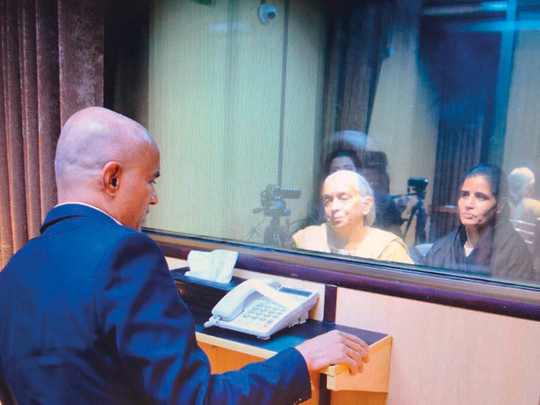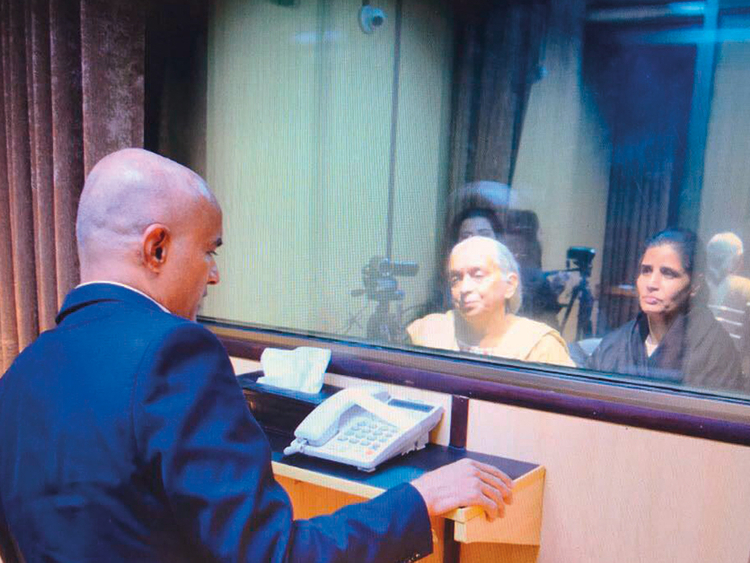
Islamabad: Islamabad allowed an Indian national sentenced to death for spying to see his family for the first time since his arrest on Monday.
Kulbhushan Sudhir Jadhav, who wore a blue jacket, met with his wife and mother at Pakistan’s Foreign Ministry in the capital, where they spoke through a glass barrier, pictures issued by the ministry showed.
The images were of low quality, and it was impossible to ascertain Jadhav’s well-being, but he was sitting up and appeared to be healthy.
Pakistani officials said Jadhav was in good health.
In a video released by authorities ahead of the meeting, Jadhav said he was grateful to Pakistan for a “grand gesture”.
The meeting, held 21 months after his arrest in March 2016, was planned to last 30 minutes but extended to 40 minutes upon the request of Jadhav and his mother.
Jadhav’s mother, Avanti, and wife, Chetankul, arrived in Islamabad on Monday to meet him at Pakistan’s Foreign Office and left soon after via an Oman Air flight. The wife and mother of Jadhav thanked Pakistan for the meeting and extended time.
“This categorically is not the last meeting of Jadhav,” Foreign Office (FO) Spokesperson Dr Mohammad Faisal said in the press briefing.
In the post-meeting press conference, Pakistan FO spokesperson said: “Pakistan permitted the meeting of wife and mother of Commander Jadhav with him on humanitarian grounds, on the birthday of the father of the nation, Quaid e Azam Mohammad Ali Jinnah.”
Jadhav’s mother and wife were accompanied by Indian Deputy High Commissioner J.P. Singh.
“The presence of J.P. Singh at today’s meeting should not be considered as consular access,” Dr Faisal clarified. Pakistan has denied consular access to him, as the Vienna Convention does not apply to those involved in espionage, he added.
Pakistan had agreed to allow the Indian media and Jadhav’s family to speak to the media. “However, the Indian government refused to allow Indian ladies to speak to the media,” Faisal said.
Elaborating on the charges against Jadhav, the FO spokesperson said: “Jadhav has been sentenced to death on espionage, terrorism and subversive activities against Pakistan after the confession of his crimes which were tasks given to him by Indian Intelligence agency RAW [Research and Analysis Wing] plan [to] coordinate terror especially in Pakistan.”
“Jadhav is the face of Indian terrorism, especially in Pakistan,” Faisal said. However, Pakistan allowed the meeting on request of India purely “on humanitarian ground and in line with Islamic practices of compassion”.
He also called upon India to follow the similar gesture and stop human rights violations in Indian-administered Jammu Kashmir.
Talking to Gulf News, Dr Zafar Nawaz Jaspal, Director at School of Politics and International Relations at Quaid-e-Azam University, said: “Pakistan agreed to the meeting on humanistic norms, indicating a positive gesture that even spies have the right to meet family.”
“With this meeting, Pakistan has also defied Indian propaganda that we are violating human rights. But this goodwill gesture should not be taken as a sign of his clemency as he would face the criminal charges and proper punishment awarded to terrorists.”
Jadhav was found guilty in a closed trial by a military court and sentenced to death.
New Delhi sought the intervention of the International Court of Justice, which ordered Pakistan to stay the execution until it passes final judgement in the case.
India has maintained that Jadhav is not a spy, and that he was kidnapped by Pakistan. New Delhi has also accused Islamabad of violating the Vienna Convention by denying consular access.
The nuclear arch-rivals routinely accuse one another of sending spies into their countries, and it is not uncommon for either nation to expel diplomats accused of espionage, particularly when tensions are high.
Death sentences, however, have rarely been carried out in such cases in recent years.
Indian national Sarabjit Singh, on death row for spying in Pakistan, was attacked and killed in jail by fellow inmates in 2013. He had been on death row for 16 years.
In Balochistan, Pakistan’s largest but least developed province, security forces have been battling a years-long separatist insurgency that authorities have repeatedly characterised as “terrorism” promoted by hostile states such as India.
Jadhav, who has two children, reportedly joined India’s prestigious National Defence Academy in 1987 and was commissioned as an engineer in the Indian Navy in 1991.
The son of a retired police officer, Jadhav’s neighbours remember him as a shy but helpful man who was good at sport and studies, according to Indian media reports.













